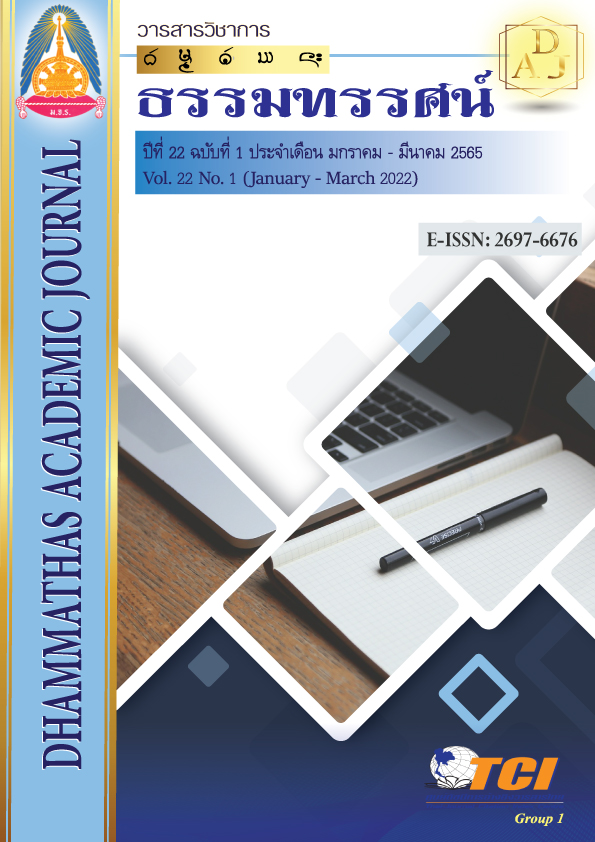Bringing the King's Science with the Principles of unity to Develop Community Potential
Main Article Content
Abstract
This research has the objectives to: 1) analyze and develop the community capacity in applying the King’s philosophy with the harmony principle to community development, 2) to create innovation integrated the King’s philosophy with the harmony principle to community development, 3) to bring the knowledge sets from the King’s philosophy with the harmony principle to train people to get some changes and increase the community capacity through multiple media publishment. This research was conducted by qualitative research by in-depth interview, focus group discussion and workshop to find out qualitative data and content analysis for qualitative data including to produce the research findings by descriptive analysis.
The results have been found as the followings:
1. Results of the analysis and development of community potential according to the SWOT guidelines of the home community bee cave found that leaders have high leadership qualities. In terms of community management that comes from the gathering of villagers in the area and neighboring villages community forest conservation has been established in terms of budget and strength from the inside out. It was found that there are networks that support the strength of the community from various external agencies. External factors have an important concept based on the extraction of resources with in the community to develop further, especially for the conservation of natural resources. and the use of benefits to promote tourism.
2. Creation of innovation by introducing the King's science with the principles of solidarity to the development of community potential. The important driving factor of the community is unity and cooperation arising from internal and external forces, aiming to achieve the goal of strengthen the community by integrating the principles of solidarity in the process of developing community potential both internally and externally. Which consists of in terms of compromise and harmonization cooperation in operation on cooperation and unison in the meeting and responsibility for both personal and public duties.
3. Bringing the knowledge set from the King's science with the principles of solidarity to community training is to bring the King's science with the principles of solidarity to develop community potential from research into dissemination for further practice.
Article Details

This work is licensed under a Creative Commons Attribution-NonCommercial-NoDerivatives 4.0 International License.
เพื่อให้เป็นไปตามกฎหมายลิขสิทธิ์ ผู้นิพนธ์ทุกท่านต้องลงลายมือชื่อในแบบฟอร์มใบมอบลิขสิทธิ์บทความ ให้แก่วารสารฯ พร้อมกับบทความต้นฉบับที่ได้แก้ไขครั้งสุดท้าย นอกจากนี้ ผู้นิพนธ์ทุกท่านต้องยืนยันว่าบทความ ต้นฉบับที่ส่งมาตีพิมพ์นั้น ได้ส่งมาตีพิมพ์เฉพาะในวารสาร วิชาการธรรม ทรรศน์ เพียงแห่งเดียวเท่านั้น หากมีการใช้ ภาพหรือตารางของผู้นิพนธ์อื่นที่ปรากฏในสิ่งตีพิมพ์อื่นมาแล้ว ผู้นิพนธ์ต้องขออนุญาตเจ้าของลิขสิทธิ์ก่อน พร้อมทั้ง แสดงหนังสือที่ได้รับการยินยอมต่อบรรณาธิการ ก่อนที่บทความจะได้รับการตีพิมพ์References
กลุ่มงานยุทธศาสตร์และข้อมูลเพื่อการพัฒนาจังหวัดนครปฐม. (2561). แผนพัฒนาจังหวัดนครปฐม 4 ปี (พ.ศ.2561-2564). นครปฐม: กลุ่มงานยุทธศาสตร์และข้อมูลเพื่อการพัฒนาจังหวัดนครปฐม.
กลุ่มงานยุทธศาสตร์และข้อมูลเพื่อการพัฒนาจังหวัดสระแก้ว. (2561). แผนพัฒนาจังหวัดสระแก้ว (พ.ศ. 2561-2564). สระแก้ว: กลุ่มงานยุทธศาสตร์และข้อมูลเพื่อการพัฒนาจังหวัดสระแก้ว
พระธรรมปิฎก (ป.อปยุตฺโต). (2546). พจนานุกรมพุทธศาสน์ ฉบับประมวลศัพท์. (พิมพ์ครั้งที่ 10). กรุงเทพฯ: เอส อาร์พริ้นติ้ง แมส โปรดักส์.
พระครูปลัดวิชาญ ชาตวีโร (แดงประไพ). (2550). การศึกษาวิเคราะหเรื่องสามัคคีธรรมในพุทธปรัชญา เถรวาท. (วิทยานิพนธศาสนศาสตรมหาบัณฑิต). กรุงเทพฯ: มหาวิทยาลัยมหามกุฏราชวิทยาลัย.
มหาวิทยาลัยมหามกุฏราชวิทยาลัย. (2553). พระไตรปิฎกและอรรถกถาแปล. (พิมพ์ครั้งที่ 4). นครปฐม: มหามกุฏราชวิทยาลัย.
สุรัสวดี หุ่นพยนต์. (2556). งานอาสาสมัครในประเทศไทยและทิศทางในอนาคต. วารสารพัฒนศาสตร์, 9(2), 1-39.
สุภางค์ จันทวานิช. (2549). การวิเคราะห์ข้อมูลในการวิจัยเชิงคุณภาพ. กรุงเทพฯ: จุฬาลงกรณ์มหาวิทยาลัย.
Brinkerhoff, W. D., & Azfar, O. (2006). Decentralized local governance in fragile states: learning from Iraq. International Review of Administrative Sciences, 75(4), 585-607.
Freire, P. (1972). Cultural Action for Freedom. Middlesex: Penguin Books.
Laverack, G. (2007). Health Promotion Practice: Building Empower Communities. Berkshire: Open University Press.

